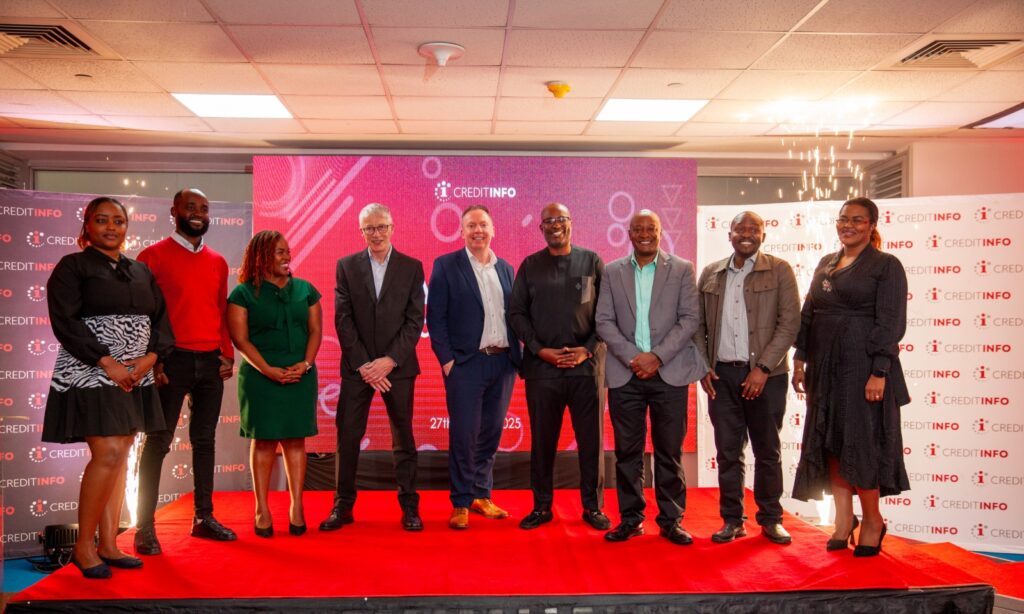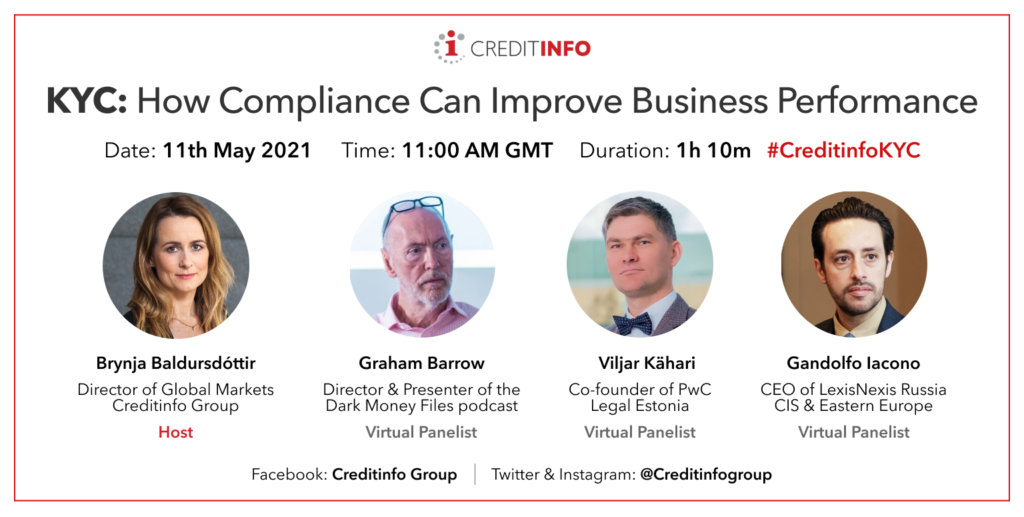Creditinfo Launches New Global Fraud & ID Solution

Creditinfo’s new solution supports clients in mitigating the impact of fraud and supporting organisational growth.
London – 27th March 2025: Creditinfo, a global service provider for credit information and risk management solutions, has today announced the launch of its global identity, know your customer (KYC), and fraud and ID solution, set to help organisations tackle financial crime.
The overall global economic impact of financial crime has been estimated to be $5 trillion. What’s more, according to the 2024 Nasdaq global financial crime report, fraud losses totalled $485.6 billion worldwide, from fraud scams and bank fraud schemes alone. As such, organisations face a series of challenges, from eroding profit margins to reputational risks to data breaches. Creditinfo’s solution helps organisations to address these challenges by using credit bureau data, government information services, and other registries to establish trust in presented identities, without negatively impacting the customer experience.
The solution integrates identity proofing, digital risk signals and comprehensive international and domestic watchlists to deliver strong KYC compliance and reduce the risk of fraudulent activity. It also enables businesses to streamline risk management and ensures they meet stringent customer due diligence requirements under anti-money laundering (AML) regulations.
As a global solution, it is tailored to meet the unique needs and maturity-levels of different markets. By accounting for these differences, organisations that use the solution can adapt their fraud prevention strategies to specific local risks, strengthening security and promoting financial inclusion.
Creditinfo has appointed Rob Meakin as Director of Fraud & Identity to head up this service. He brings extensive experience in fraud prevention, identity management, and financial services. Meakin will lead efforts to help organisations counter fraud – leveraging advanced technologies and data analytics to enhance the customer experience and strengthen fraud and AML controls.
Rob Meakin, Director of Fraud and Identity at Creditinfo, said: “The growing presence of organised financial crime is significantly hindering economic growth on both a local and global scale, costing businesses huge sums of money each year – in fraud losses, lost sales and operational costs. That’s why, at Creditinfo, we’re pioneering a solution that provides a way for organisations to manage risk and maintain compliance while facilitating secure and easy access to financial products and services for consumers.”
John Cannon, Chief Commercial Officer at Creditinfo said: “By removing friction from both traditional and digital onboarding and origination processes, our solution helps organisations reduce fraud, improve conversion rates, and drive top-line growth while ensuring a seamless customer journey. As we strive to expand our global reach and enhance financial access for millions of consumers and businesses worldwide, having Rob join our team is an invaluable advantage, strengthening both our security capabilities and our ability to deliver innovative solutions.”
-END-
About Creditinfo
Established in 1997 and headquartered in London, UK, Creditinfo is a provider of credit information and risk management solutions worldwide. As one of the fastest-growing companies in its field, Creditinfo facilitates access to finance, through intelligent information, software and decision analytics solutions.
With more than 30 credit bureaus running today, Creditinfo has the most considerable global presence in this field of credit risk management, with a significantly greater footprint than competitors. For decades it has provided business information, risk management and credit bureau solutions to some of the largest, lenders, governments and central banks globally to increase financial inclusion and generate economic growth by allowing credit access for SMEs and individuals.
For more information, please visit www.creditinfo.com
For inquiries email rob.meakin@creditinfo.com
Download Brochure HereCreditinfo Estonia’s sanctions’ monitoring solution for small businesses

With the ongoing aggression initiated by the Russian Federation in Ukraine, the need to implement international sanctions has to be embedded in the daily business activities of our companies.
We know that companies – operating in the fields of activity subject to such a special obligation – must do more due diligence to mitigate the risks associated with implementing sanctions, but the processes should be somewhat similar to all of the companies operating in Estonia.
Such companies, whose daily economic activities do not deal with continuous customer background research or transaction monitoring, can sometimes be in a difficult situation where they do not have enough know-how or manpower resources to assess the risk of whether one of their customers or partners falls under the established restrictions or not.
Finding such a necessary workforce is always possible, but as you know, making such a fixed cost can sometimes be impossible according to the company’s business model. In this case, one of the options is to delegate the control of said risks outside the company or to use convenient and straightforward, but at the same time reliable services to help with this task, which are available on the market.
For these cases, Creditinfo is offering small businesses the opportunity to mitigate their risks in two ways – by delegating the checking of compliance with sanction lists for their customers and partners entirely to us or by using a straightforward and convenient solution on our e-Krediidiinfo portal – WebScreening.
The web-based service WebScreening allows you to request the entry of a person of interest to you through a convenient and comprehensive user interface, both on international sanctions (European Union and the United Nations) and watch lists (so-called local sanctions and “black lists” of various countries, in some instances, for example, wanted persons) as well as persons with a national background ( PEP) from the lists.
With additional functions, it is possible to perform user management in the portal (if the company has more than one user) or view the archive of requests made. At this point, it is good to note that the archive of performed requests is convenient to use, for example, to check the performance of the employee’s duties and prove the requests made to the supervisory authority, if necessary.
Check out the service: www.creditinfo.ee/kyc
KYC: How compliance can improve business performance – post event summary

Know Your Customer (KYC) is not just a set of regulations to comply with. With the right data, processes, and technology, it can be a valuable tool to understand our customers better and thus be able to support them throughout their challenges, while at the same time shielding business owners from unnecessary risk. We wanted to delve a little deeper into this issue and so hosted a webinar with leading experts on the regulatory environment and financial crime to delve into the topic. Our panel of experts discussed what organizations need to do to de-risk their operations and how they can set themselves up for future success.
Our expert panel was made up of Graham Barrow, Director and Presenter of the Dark Money Files podcast, Viljar Kähari, Co-founder of PWC Legal Estonia and Gandolfo Iacono, CEO of LexisNexis Russia CIS & Eastern Europe.
Chaired by our Director of Global Markets, Brynja Baldursdóttir, the webinar drew in over 500 registrants and 300 attendees from 33 different countries, all eager to better understand the opportunities compliance technologies can bring to a business.
Brynja began the session by explaining that KYC is not just a box ticking exercise, it is a necessity for better business in 2021. The key thing to consider is that KYC is all about trust.
Dark Money
To begin, Graham contextualized the important role that KYC plays in protecting the financial system from ‘dark money’. Dark money, “which is any money that enters the financial system for which you cannot show for certain where it comes from”, has real victims that do not show up on paper. Dark money must come at a cost to somebody. Better KYC processes are not just protecting customers and businesses, it also protects taxpayers in corrupt countries and potential victims of money laundering all over the world.
Part of the issue with stopping or at least resisting the flow of dark money according to Viljar Kähari, is that “banks interpret KYC requirements very differently. It seems that client onboarding and monitoring processes are sometimes much more important than actually understanding a client’s business and monitoring transactions.” This alludes to what Graham believes the larger problem to be, that, “there really is a big difference between banks being compliant in terms of the anti-financial crime requirements, and stopping dirty money entering the system.”
Understand your customer
To shift from just being compliant with regulations to stopping financial crime with compliance we must progress from Knowing Your Customer to ‘Understanding Your Customer’ (UYC), a phrase Graham coined during the discussion. He commented that this is “because if people are intent on laundering money, they will provide beautiful documentation to get into the financial institution, but that documentation will need to be lies.” If we can go beyond knowing our customer to understanding them, then we can see through even the best lies. “Because if you force people and criminals to lie when they create the accounts documentation, you then have good documentation to monitor the downstream transactions. And that is the control. It is getting them to say in detail what they want you to hear and then monitor in detail what they actually do. It’s the difference between those two things, which is your control.”
Data, data, data
Our panelists agreed that the bridge between KYC and ‘UYC’ is data. Graham commented that “the ability to take KYC data, and feed it into your transaction monitoring system intelligently, is probably the single most important thing we can do. But we must sell one idea to all our customers. The idea that KYC is not an ordeal we have to put the customer through. It is the most important thing we can do to protect them.”
There are barriers that compliance teams need to break through to get to this next level of KYC. Gandolfo says, “the issue is that we see compliance or AML as a cost centre”. Compliance departments need to be seen as an asset hat needs serious data and software,” and many managers are not aware of this. Managers need to see the value that effective compliance brings in potential fines avoided. Viljar concurred, “compliance departments are overloaded. They do not have the resources they need; they do not have access to different databases.”
Perception
The perception of compliance needs to change for organizations to allocate the resources teams need to resist the flow of ‘dark money’. Viljar stated that “changing the mindset of compliance officers from an inspector to a business advisor is more important and necessary today. Because we cannot assume that all clients are criminals unless they can prove otherwise. It is the common understanding now because you need to provide a massive amount of information and documentation to show that you are getting your money legally. And that is why I’m thinking that the compliance function must become more proactive at finding practical solutions rather than just saying ‘that this work cannot be done.’”
To make this organizational culture shift it will take time, but our panel agreed that a realistic alternative is to outsource KYC and AML, provided there is not a “homogenization of risk appetite”. Viljar noted that when a company does not have access to a public register, “there are several service providers who can easily help to solve this problem. Just the banks and other regulated financial institutions must trust service providers and user services.”
Change of mindset
Summarizing the event Brynja rounded up the discussion by pointing out that the most important takeaway from the webinar is that as an industry, we need to start changing our mindset from knowing our customer, to understanding our customer. We need to vastly improve international cooperation in terms of legislation and regulation, and we can refine processes around KYC in terms of increasing shared services, using data and technology in a smarter manner which ultimately should make sure that we as businesses make our processes reflect our appetite for risk. It is time to make the switch from simply knowing, to understanding our customers.
Learn more
This virtual event was a huge success from our perspective which gathered an incredibly engaged audience. Thank you so much for all your brilliant questions – our panel enjoyed the lively debate!
If you would like to re-watch the session, or if you were unable to attend, please use this link to learn about the benefits KYC compliance can bring to your business.
Can KYC Bring Opportunity For Business Growth?

For many, due diligence checks and Know Your Customer (KYC) processes are simply seen as compliance requirements imposed by regulators that can add friction and cost to their business, but that is a flawed assessment. In fact, KYC has many advantages for business and can act as the differentiator needed for your business to survive and thrive in the increasingly digital, global economy.
In a market full of uncertainty, true understanding is a valuable commodity. Today, many organizations have been forced to re-evaluate what they need to do to ensure not just their longevity, but their continued success. Knowing the pressures that customers and prospects face, being able to support them through their challenges and shield your own business from unnecessary risk is key.
However, there are still too many treating KYC compliance like a tick box exercise, and not the competitive point of difference it can be.
The potential and possibilities that arise from a well-conceived and resourced compliance organization is remarkable. Whether it’s through the use of better data, fusing local data with global intelligence, or understanding the emerging threats from organized, financial criminal groups and working to counter them, good compliance can help businesses avoid the most damaging risks and seize the most lucrative opportunities.
At Creditinfo, we’ve long understood this. Our customers know that the combination of our decision analytics technology and access to a wide range of traditional and alternative data provides them with the tools they need to better understand their customers and take the appropriate steps to capitalize on the opportunities on their doorstep.
These opportunities are only ever going to increase, and those that become complacent on compliance, will begin to fall behind.
Tomorrow, on May 11th, we are hosting a webinar with leading experts on the regulatory environment and financial crime to delve into just this. Our panel of experts will discuss what organizations need to do to de-risk their operations and how they can set themselves up for future success.
This virtual panel will include speakers from PwC, Lexis Nexis, and The Dark Money Files, and will cover compliance technology, regulatory trends, and the ever-evolving threat landscape, to help you understand what you need to do to protect your organization from financial crime, and the opportunities better KYC processes can bring to your business.
To hear more about the benefits better KYC compliance could create for your business, register your attendance today.
You can also follow along on Twitter with the hashtag #CreditinfoKYC.




